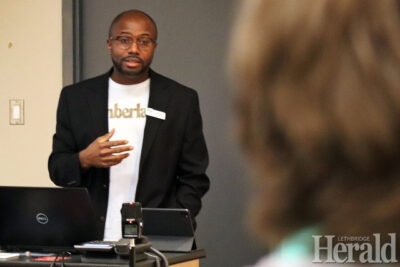John Ware film prompts discussion on evils of slavery
By Alejandra Pulido-Guzman - Lethbridge Herald on February 10, 2022.
 Herald photo by Alejandra Pulido-Guzman
Lethbridge College Instructor in the School of Justice Studies and panelist, Ibrahim Turay, leads a discussion followed a screening of 'John Ware Reclaimed' on Tuesday at Lethbridge College.
Herald photo by Alejandra Pulido-Guzman
Lethbridge College Instructor in the School of Justice Studies and panelist, Ibrahim Turay, leads a discussion followed a screening of 'John Ware Reclaimed' on Tuesday at Lethbridge College.LETHBRIDGE HERALDapulido@lethbridgeherald.com
As part of their Black History Month celebration Lethbridge College offered a screening of John Ware Reclaimed Tuesday in the E.C. Fredericks Theatre.
Ibrahim Turay, instructor in the School of Justice Studies, lead a panel discussion after the screening, with some members in attendance via Zoom and others in person.
The film follows Cheryl Foggo as she examines the mythology around John Ware, a Black cowboy who settled in Alberta before the turn of the 20th century.
Foggo aims to discover who this iconic figure was and what his legacy means in terms of anti-Black racism past and present.
“Watching this documentary reminds me of the importance of educational institutions in rewriting the history, in bringing out some of the histories that were once buried, and our responsibilities as instructors in this institution to be the leaders in bringing some of these histories out,” said Turay.
He said that when we think about the history of black peoples in Canada, it is often in connection to the history of black people in United States, whom we refer to as African Americans today. And therefore, when we think about the history of African Americans and black Canadians as well, it is also leading to the history of slavery.
“I want to talk about a little bit about my understanding of slavery from my history, because we learned our history in terms of the history of slavery from high school,” said Turay.
He said when you think about slavery, you think about able bodied men, younger men, and younger women, who are being taken away from their homes. Whether sold into slavery, or kidnapped, or stolen.
“So, I see Africa during that period as always being in a state of mourning,” said Turay.
He said he wanted to talk about that idea of mourning where the old were left to look after themselves and were unable, and the young were left to look after themselves and were also unable.
“When we think about what we see today in Africa and developing, we have to think about the impact of that being in a state of mourning all the time, because we have the body-abled people taken away from the land, taken away from Africa and brought to this control in North America,” said Turay.
He said we have to think about it from that perspective. Not only people were taken away, they had colonial rule that lasted until the 1960s and that period of time was marked by extractions of raw materials from Africa and being transported either to North America or European countries.
“European countries and North America were developing while Africa was still seen as a place to extract raw materials,” said Turay.
He said some may argue that colonialism ended in the 1960s while others may argue that it is still happening today as Africa is still seen as a place where raw materials could be extracted and be shipped out.
“This documentary provided an example for us to see how whether when you tell your own story – stories are important – we learn by hearing others talk about their stories and so on but it’s always important for you to tell your own story from your own perspective,” said Turay.
He also mentioned the importance of identity and how that played a role in how slaves were separated from others that spoke the same language.
“The assumption was that if they can speak, if you allow them to communicate to speak the same language and live in the same plantation, it is possible that they are going to organize some form of rebellion and revolt against the slave owners,” said Turay.
He said it was a common practice to separate people who may be able to speak the same language and communicate within the same plantations.
“So now we can see the loss of language, their languages tie into that idea of identity,” said Turay.
He said the documentary also allows us to see that black people have been here since the 1800s, especially in this province, and have contributed a lot to the pioneers of the province.
“It’s important for us to think about it, and not seeing black people here as people that are recent. Of course today we have a number of different groups in terms of immigration. When you see a black person that doesn’t necessarily mean that you are refugee or something like it,” said Turay.
He said people tend to rush to some negative connotations when someone identifies as a refugee. Turay said people believe that when they arrive they get everything for free from the government.
“When you come here, the money that was used to buy your ticket, that is a loan that you get from the government and you have to pay it back so it’s nothing free,” said Turay.
He said instead of assuming black people are refugees getting free stuff, it is more important for us to reflect on the state of mourning that Africans countries were left in. To reflect on all those who lost their kids and who had their relatives stolen.
Follow @APulidoHerald on Twitter
4-3




